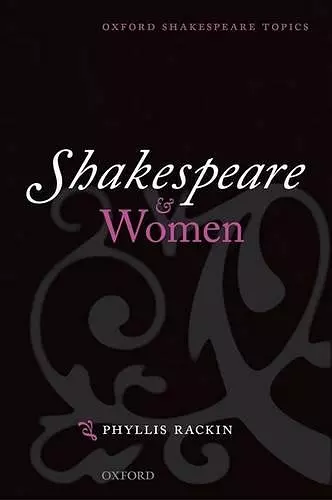Shakespeare and Women
Format:Paperback
Publisher:Oxford University Press
Published:26th May '05
Currently unavailable, and unfortunately no date known when it will be back

Shakespeare and Women situates Shakespeare's female characters in multiple historical contexts, ranging from the early modern England in which they originated to the contemporary Western world in which our own encounters with them are staged. In so doing, this book seeks to challenge currently prevalent views of Shakespeare's women-both the women he depicted in his plays and the women he encountered in the world he inhabited. Chapter 1, 'A Usable History', analyses the implications and consequences of the emphasis on patriarchal power, male misogyny, and women's oppression that has dominated recent feminist Shakespeare scholarship, while subsequent chapters propose alternative models for feminist analysis. Chapter 2, 'The Place(s) of Women in Shakespeare's World', emphasizes the frequently overlooked kinds of social, political, and economic agency exercised by the women Shakespeare would have known in both Stratford and London. Chapter 3, 'Our Canon, Ourselves', addresses the implications of the modern popularity of plays such as The Taming of the Shrew which seem to endorse women's subjugation, arguing that the plays-and the aspects of those plays-that we have chosen to emphasize tell us more about our own assumptions than about the beliefs that informed the responses of Shakespeare's first audiences. Chapter 4, 'Boys will be Girls', explores the consequences for women of the use of male actors to play women's roles. Chapter 5, 'The Lady's Reeking Breath', turns to the sonnets, the texts that seem most resistant to feminist appropriation, to argue that Shakespeare's rewriting of the idealized Petrarchan lady anticipates modern feminist critiques of the essential misogyny of the Petrarchan tradition. The final chapter, 'Shakespeare's Timeless Women', surveys the implication of Shakespeare's female characters in the process of historical change, as they have been repeatedly updated to conform to changing conceptions of women's nature and women's social roles, serving in ever-changing guises as models of an unchanging, universal female nature.
[this book] is not just a rich and original resource for scholars interested in fin-de-siècle Shakespeare or women performers of that period but also an encouragement to others working on Shakespearean performances in different historical times. * Susan Bennett, Modern Drama *
Phyllis Rackin has provide us with a deftly defined casebook for the reconsideration of feminist criticism in the twenty-first century that looks to the future through a clear articulation of that criticism's past ... In each chapter, Rackin provides an alternative to the limiting assumptions she describes and thus offers brave new ways of seeing ... In focusing on the question of Shakespeare and women in the twenty-first century, Phyllis Rackin has renewed a sense of the feminist agenda within the field of Shakespeare studies. * Rebecca Laroche, Shakespeare Quarterly *
Believing that historical research can provide rich resources to revitalize feminist criticism (if one looks for them), Rackin ably and amply points the way. She examines the place(s) of women in Shakespeare's world; the tendency to shape the canon in the reader's own image; the powerful truths Shakespeare offers about women (notably in Cleopatra) and life, truths evident despite or sometimes because of the use of boy actors; Shakespeare's 'complicated negotiation with the Petrachan tradition' in the sonnets, which succeed, while addressing both sexes, in enabling women to think and feel honestly about themselves; and the continuous contemporaneousness of Shakespeare's women. The 'Further Reading' section is a vein of rich ore. Essential. * Choice *
- Winner of *Choice* Outstanding Academic Book 2006.
ISBN: 9780198186946
Dimensions: 204mm x 136mm x 12mm
Weight: 198g
180 pages